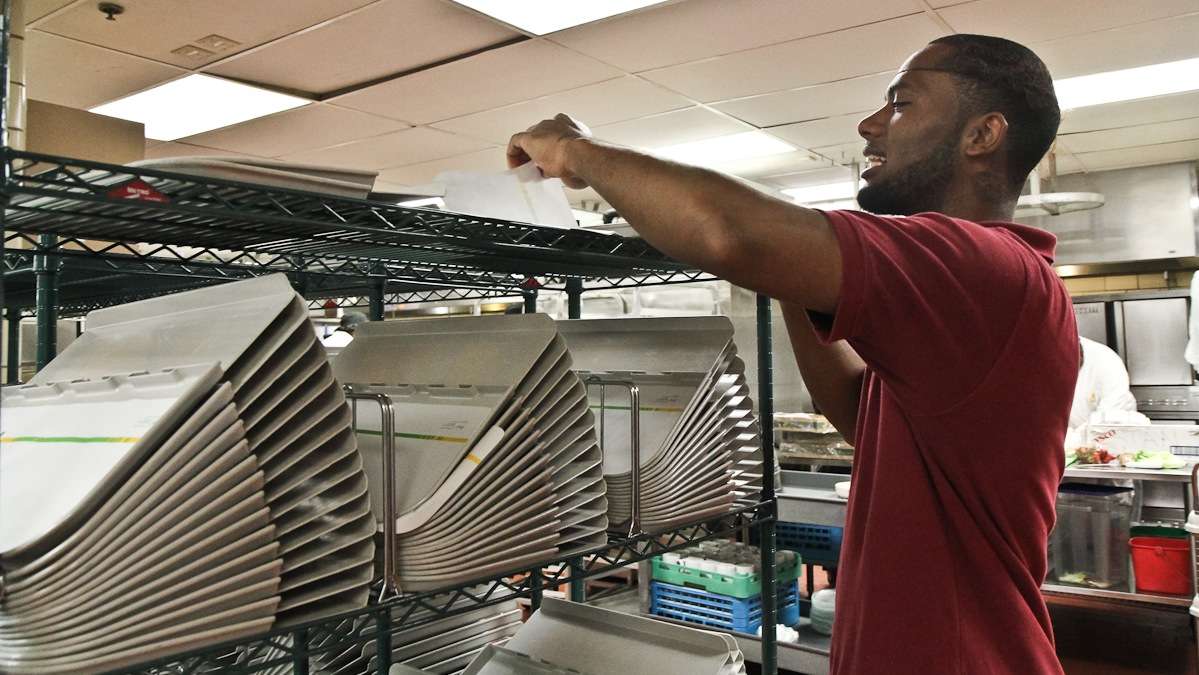Students with special needs gain job skill training at Einstein Medical Center
Listen-

-

-

-

-

-

Ryan Stone graduated from the program two years ago and was hired at Einstein as a full-time staff member. (Kimberly Paynter/for The Pulse)
-

Finding a job is a major challenge for many people with special needs, but a Philadelphia program is hoping to give them a leg up on the competition.
For high school students with special needs, classes that provide job training can be crucial in helping them find employment after graduation. For 40 years, Einstein Medical Center’s Ancillary Hospital Services Program has collaborated with the Philadelphia school district on vocational training for special needs student volunteers.
Mark Spiller coordinates the program and was instrumental in its creation 40 years ago.
“It’s my baby,” he says.
Spiller began his career as a special education teacher at Olney High School back in 1973. He says it didn’t take him long to realize his students needed more than he could give them in the classroom.
“This may be heresy in some circles, but not everybody is going to college. It became quickly apparent to me that these students needed some sort of vocational experience other than the academics,” says Spiller.
Maggie Haag directs adult transition programs at Devereux, an organization that provides services for adults with intellectual disabilities, behavioral healthcare needs and autism. She recommends that schools start providing students with job skills as early as age 14.
“I think that any type of job training prior to graduation, for students that want to work when they graduate, is invaluable, says Haag. “The way, we look at it is, you can’t really begin practicing those skills early enough.”
A rotating training cycle
Each day, 18 juniors and seniors from four different area schools spend three hours volunteering at Einstein, working alongside of and being mentored by hospital staff before returning to their classrooms. The students in the program have a variety of special needs.
“The majority of our students are classified as having learning disabilities, learning difficulties,” says Spiller.
Even though the students are volunteers, Mark Spiller instills a strong work ethic. They must show up on time with ID badges properly displayed, wearing their volunteer smocks or aprons. Their work day begins promply at 8 a.m. and they punch in on a real time clock.
Students try out four different job training stations in the course of the school year, gaining experience in many different positions.
“We do a little bit of everything,” says Spiller. “From storage and delivery of supplies to patient transport, patient aides, clerical, housekeeping, storeroom, printshop, mailroom, linen services. You name it, we do it.”
High school junior Guadalupe Suarez is on her final vocational rotation, helping out with clerical duties in the antenatal testing unit.
“I file the patient charts in alphabetical order, pull out the ones for next day, pull out the ones that need to be taken to medical records,” says Suarez. When I’m finished, I see if there is anything else for me to do.”
It’s the end of the school year and Suarez has been through the entire vocational line up. She’s helped process lab work in labor and delivery, assisted patients in physical therapy and even pitched in with housekeeping. Antenatal testing is her final stop.
“I liked all of my training stations,” says Suarez. “So much that I can’t decide which one was best.”
Students like Suarez can leave the program with an edge in the competitive market for hospital service workers at one of the region’s hundreds of medical facilities. Since 1975, the program has trained 600 students with many going on to find jobs in healthcare.
When mentoring goes full circle
Rhonda Haines came out of the program in 1983 and when she graduated a year later, she took a job as hostess in the oncology and pyschiatry departments at Einsten Medical Center.
“Yes, I’ve been here 29 years,” she says, laughing.
Haines says that she loved the vocational program and she really enjoys her work.
“As long as I’m pleasing my patients and they are letting me know I’m doing a good job – yes, that’s what I like, the patients.”
Mark Spiller is proud of all of his students, but is especially happy when “distinguised alumni” like Haines, come out of the program and get jobs at Einstein.
“To me, the full circle of success is when these former students, who were student volunteers, became employees and now become mentors of the new crop of student volunteers,” says Spiller. “That’s just incredible.”
WHYY is your source for fact-based, in-depth journalism and information. As a nonprofit organization, we rely on financial support from readers like you. Please give today.



